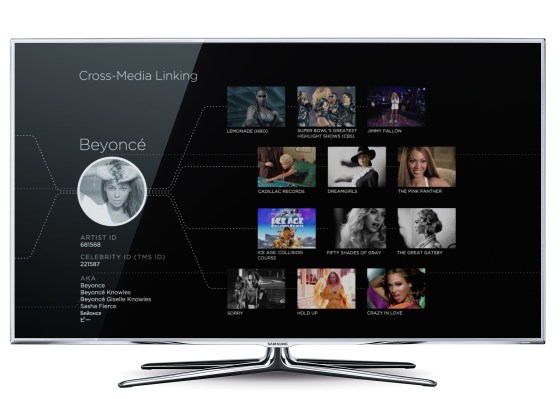Media metadata company Gracenote is looking to be the one-stop data provider for TV providers, device manufacturers and various media distribution services. To do so, the company has unified its vast stores of music, video and sports data into a single database with a common schema and set of APIs to access it.
Gracenote has had a lot of corporate homes and has transformed itself quite a bit over the years. When I first started covering the company, it was part of Sony and provided metadata mostly to music services like iTunes and Spotify. Then, it was acquired by Tribune, got rolled up with Tribune Media Services, and started making some acquisitions of its own.
Most recently, Nielsen announced it was buying Gracenote and closed on the acquisition just a few weeks ago. But the company Nielsen bought — and the data it provides — is much more robust than what it was just a few years ago.
Today Gracenote has taken all of the different companies and sources of data it had acquired over the years and unified it into a common data set to offer coverage across a number of verticals and geographies.
Together, the company says it has TV schedules for more than 85 countries, live scores and statistics for sporting leagues and events all around the world, and musical data for basically every song ever recorded. That allows media distributors even more power in being to identify and help users search and discover content that interests them.
“Our vision was to have a global product and a multi-vertical product,” Gracenote chief product officer Rich Cusick told me. “It’s taken two-and-a-half years to realize that vision.”
Now in a world where consumer electronics manufacturers and media services are increasingly global in nature, Gracenote will be able to serve up metadata that identifies all the content they serve. Roku, for instance, will be using Gracenote data in its streaming media boxes to help power search and discovery across all the channels and services it supports.
Having a unified dataset is also important in a world where there are more crossover stars between music, movies, and sports than ever before.
Gracenote likes to use the examples of Beyonce and LeBron James to show how music and sports stars are increasingly finding themselves on TV and more broadly in pop culture. But I’d like to point out Shaquille O’Neal, the original triple threat, who dominated the paint as center of the Orlando Magic, Los Angeles Lakers and Miami Heat, starred in films like Kazaam and Steel, and had an incredible (if short lived) rap career.
Thanks to Gracenote, now you will be able to identify and search for Shaq no matter what he’s doing — dunking on Chris Dudley, dressing up like a genie, or rapping with the Fu-Schnickens.
